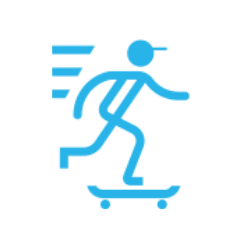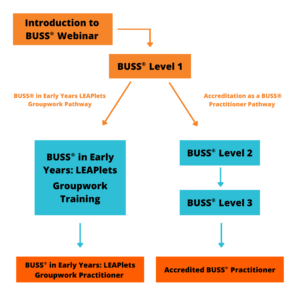We’re keen to work with individuals and organisations to train people in BUSS®. Training in BUSS® is highly interactive with a balance of theory, practical activities and homework tasks to build skills and expertise.
There are different training pathways, depending on an individual’s core training / experience and the needs of an organisation. The training can lead to an increased knowledge and understanding of the model, or to accreditation as a BUSS® Practitioner or as a LEAPlets Group Leader. For more detail on BUSS® accreditation, please click here.
The Introduction to BUSS® training day is delivered remotely. Level One and Level Two training are a blend of face to face and remote learning. Level Three training is delivered remotely.
For information about upcoming BUSS® training and to find a BUSS® training near you, please go to our upcoming events page.
All BUSS® training in the UK is overseen by Sarah Lloyd. No other training or accreditation in the BUSS® Model is approved or recognised by BUSS® Model Ltd. If you have any queries about this, please contact us on info@bussmodel.org.


Training is available for individuals and organisations. It’s anticipated that more people will train at Introduction and Level One stages than will progress to become Accredited BUSS® Practitioners and Consultants. Bespoke training and ongoing work can also be offered for organisations with different requirements (e.g. education). The Pathway to becoming an Accredited BUSS® Practitioner and the Pathway to becoming a BUSS® in Early Years LEAPlets Group Leader can be seen below. To download it, and to see the professional requirements to attend each course click here.


This one-day webinar provides an introduction to the BUSS® Model. BUSS® is a relationally based model that can be helpful when there has been disruption at the start of a child’s life. A lot of work in BUSS® focuses on bodily regulation and the role this plays in the future development of the child’s emotional regulation, play, and relationships. For typically developing children, bodily regulation grows through those repeated touch, nurture and movement experiences that a child needs for their brain and central nervous system to develop.
BUSS® is a relationally based model, supporting parents and carers as the experts on their child, to go back and fill in gaps in their child’s touch, nurture and movement experiences to support the development of bodily regulation. On this webinar, participants will gain an understanding of the theoretical framework underpinning the model, its application and research around the model.
This day is delivered on Zoom and is a mixture of teaching, small group discussion and input from parents who have used the model with their children. The Introduction Day is the foundation for any further training in BUSS®.
This day is aimed at professionals from health, education and social care, as well as adoptive parents, foster carers and special guardians. For some people, increasing their basic understanding of the model will be as much as they want to do. For others, it might be the beginning of their training as a LEAPlets Practitioner or an Accredited BUSS® Practitioner. We also have parents and foster carers that join the Introductory training, wondering if BUSS® might be helpful for their child.
The course costs £70.00 (plus VAT) per person for the one day training. This includes a copy of ‘Improving Sensory Processing in Traumatised Children’ (Lloyd, S. 2016) and a workbook to guide participants through the day.
Introduction to BUSS® courses run throughout the year. For information about upcoming events, please click here.
If you have any questions, please contact our team at info@bussmodel.org.
As well as the advertised events, the team is always happy to discuss commissioned training. Please contact us on info@bussmodel.org.

“The delivery of the content and explanations of a child’s motor development were well pitched for professionals with limited prior knowledge. The first hand testimonials from the parent mentors were very useful.” – Emma, Teacher, Bradford, West Yorkshire.
“The parents who shared their stories really helped bring to life how BUSS® had helped. It was clear how passionate the presenters were about BUSS® and as a result the training was very engaging. Good to return to the same breakout rooms throughout the day.” – Karen, Fostering Support Worker, Swansea.
“There was a clear description and rationale for the model. I enjoyed hearing from Parents sharing their BUSS® journeys.” – Philippa, Social Worker, Dorset.
Level One training builds on the one day ‘Introduction to the BUSS® Model’ training. It is designed to increase participants’ knowledge and understanding of the model, the key tenets of which are movement, playfulness and relationships. Using teaching, case studies of children aged between 3 years and 17 years, video, small group work and hearing from parents experienced in using the model, participants will develop their understanding of how a young child’s bodily regulation develops through their early attachment experiences.
Following the blueprint of typically developing children, and using a combination of teaching and video observation, participants will develop their understanding of child development, the significance of disruption to this process and the impact this has on relationships, play, behaviour and learning. Participants will be supported to develop their skills in observing movement and how they might begin to use this information to form a hypothesis about a child’s foundation sensorimotor systems.
Participants will hear from parents who have used the model with their children and have the chance to see as well as hear the impact this has had.
Participants will be introduced to the BUSS® Screening Tool, having the chance to think about how it is used as part of a clinical intervention with families.
Level One also offers more detailed information about LEAPlets (the BUSS® in Early Years Groupwork programme), hearing from parents and carers who have been part of the group, and looking at early data and outcome measures.
Please note: there is a homework task between day 2 and day 3 of training, where participants will be asked to observe two typically developing children. Guidance is given on the training about this.
This course is suitable for anyone who has completed our Introduction to the BUSS® Model training and who is interested in either delivering LEAPlets or going on to become an accredited practitioner.
This course is not suitable for participants wishing to develop skills in sensory integration therapy with children who have sensory processing disorders.
After Level One training, delegates who wish to progress have two options. They can enrol on the LEAPlets training, or may be eligible to progress towards accreditation as a BUSS® Practitioner. To do this, participants need to have a core clinical or social work training and be registered with the relevant professional body (e.g. HCPC, Social Work England or equivalent).
The Level One training costs £600.00 (+ VAT) per person for the three day training.
Please see our upcoming events page to see the calendar of upcoming training events.
As well as the advertised events, the team is always happy to discuss commissioned training. Please contact us on info@bussmodel.org.

“Absolutely a must for all practitioners working with children who have experienced trauma. Strongly practical and alternative early formulation involving thinking about underdeveloped sensory motor systems” – Laura, Clinical Psychologist.
“I really enjoyed the training! The amount of video evidence – listening to parents and watching children move and improve; How theory and practice went together throughout the 2 days; The venue was brilliant and the atmosphere in the group was conducive to learning together; The mix of different professionals in the room was helpful.” – Anne, Occupational Therapist.
“It was well presented and totally relevant to my work. The style and content of presentation was engaging, information felt accessible and applicable to practice.” – Emma, Independent Therapeutic Social Worker.
Level Two training builds on the Level One training and it is necessary for participants to have attended the three days of Level One within the last 18 months and have successfully completed the observations and their reflections on the observations.
This three-day course is designed to teach participants how to work with families / carers to assess the state of development of an individual child or young person’s foundation sensorimotor systems. Using teaching, case studies, video, small group work and hearing from parents and therapists experienced in using the model, participants will first develop their skills in the administration of the assessment.
To pass Level Two training and be eligible to move onto Level Three training in BUSS®, participants must be able to demonstrate that they can administer the assessment to two typically developing children, with fidelity to the model and the underpinning tenets of movement, relationships and playfulness. Participants are required to send recordings of themselves administering the assessment with two typically developing children of different ages. To help with this, when participants are satisfied with their assessment, we will send a checklist for them to use to aid reflection. This list of suggestions are based on the experiences of previous trainees – we call this the ‘common pitfalls’ checklist!
If the recordings submitted do not meet the required standard, participants will be offered the chance to resubmit these, incurring an additional fee for assessment of these.
By the end of Level Two training, participants should be able to:
This course is suitable for participants with a prerequisite core professional training in either Social Work, Clinical Psychology, Educational Psychology, Occupational Therapy, Speech and Language Therapy, Physiotherapy or Child Psychotherapy, and who also have training and experience supporting families who have experienced developmental trauma. We are happy to discuss, on a case by case basis, practitioners who have, for example, a Play Therapy training and are working in a Multidisciplinary Team.
If you have any queries or wish to discuss your application further, please get in touch with us at – info@bussmodel.org.
Please note, BUSS® is not a sensory integration intervention and this course is not suitable for participants wishing to develop skills in sensory integration therapy with children who have sensory processing disorders.
The Level Two training costs £660.00 (+ VAT) per person for the three days of training.
Please see our upcoming events page to see the calendar of upcoming training events.
As well as the advertised events, the team is always happy to discuss commissioned training. Please contact us on info@bussmodel.org

“It was really helpful to think in small groups about the practice assessments. I learned a lot from the feedback from Sarah & thinking about meeting the child/ family in front of you, whilst being clear about the aim of each activity and the information it can provide. It was also incredibly helpful to hear other group members’ experiences of practising the assessment and learn from each other.” – Jennifer, Clinical Psychologist.
“The learning provided a great balance between theory and practice, which I found really helpful. The BUSS® team is wonderful at making everyone feel at ease and created a fabulous learning atmosphere. The use of video recordings and writing part of an assessment report were really helpful for embedding the learning between days 2 and 3 as well. I also liked the use of the feedback groups in the morning on day 3, it was really helpful to hear everyone’s reflections from their practice of the BUSS® activities.” – Aeron, Occupational Therapist.
“The trainers were very knowledgeable, explained theory and process very clearly – it seemed they had a really good sense of the groups needs – and friendly/warm. It was good to have time to practise the activities. The workbook is great.” – Neave, Specialist Attachment Practitioner.
This is the supervised practicum part of the training. For teams, it’s usually helpful to have more than one person train at the same time, so they can support each other as they build their skills in assessment, designing programmes, evaluation and report writing. There will be opportunities within the Level Three training to follow up on relevant themes from Level One and Level Two training.
Working with practitioners’ own families, Level Three is a supervised, skills based process that is designed to allow practitioners to gain a deeper understanding of the theory and practice of BUSS®. Communication about this intervention for families and other organisations is critical to the success of this intervention and support will be given in BUSS® report writing.
Supervision from a BUSS® Consultant and participation in Parent Mentor led peer group supervision groups will support participants to develop their skills in using BUSS® with at least four families with children of different ages, between 5 and 18. Participants will be helped to work through the core competencies required in order to reach accreditation. This includes competence in administering the assessment, working collaboratively with the child and family in the delivery of the intervention, and report writing. It typically takes practitioners between 16 and 24 months to complete Level Three, depending on individual circumstances.
Once all core competencies have been achieved, practitioners can call themselves Accredited BUSS® Practitioners, and join the register of practitioners which is held by BUSS® Model Ltd.
BUSS® Practitioner core competencies will form the basis for work throughout the training. Participants progressing from Level Two through Level Three training will review this document regularly throughout the supervision process. It will then be used to evidence competence to become an Accredited BUSS® Practitioner. Click here to download a copy of the accreditation process document, which contains the core competencies.
This course is suitable for all professionals working with children who have experienced developmental trauma who have completed Level One and Level Two BUSS® training. This includes participants from health, education and social care.
This course is not suitable for participants wishing to develop skills in sensory integration therapy with children who have sensory processing disorders.
To enquire about fees and the application process, please contact vicky.holland@bussmodel.org.

“Thank you all for your amazing support all the way through – the training and supervision is fantastic and so thoughtful. Honestly the best training I have done!” – Aeron, Senior Occupational Therapist & Accredited BUSS® Practitioner.
Accredited BUSS® Practitioners who are interested in developing their skills in supervision of other BUSS® Practitioners in training or post accreditation can work towards BUSS® Consultant status. This comprises a combination of supervised practice and supervised supervision of BUSS® trainees. Further details are available on request. Please contact us on info@bussmodel.org.

This will be the most valuable training you could ever do. Totally changed my thinking and understanding of the children I work with. The BUSS Model is the missing piece of the jigsaw and Sarah makes her incredible knowledge so accessible. One not to miss.
"I loved listening to parents and how BUSS has helped them and understanding just how much underdeveloped sensory motor systems impacts children’s development and lives and relationships."
"A fascinating much needed training. Really well delivered and balance of theory and real life experience."
“As a trainer, really engaging, doesn’t use jargon and makes sure info is accessible.”
"Very well explained- loved the use of analogies, good overview of theoretical underpinnings with practical strategies. Inspiring, Informative, and engaging"
"Inspiring, excellent, and thought provoking. Loved how active the training session is. The videos were really helpful."
“How surprisingly easy it can be to make changes - very useful to try out activities and learn strategies.”
“It’s been a fantastic, thought provoking training – highlights simple techniques that can make such a huge qualitative difference to our children’s lives!”
“It's been so interesting learning about the systems and being provided with tools on how to rebuild these systems”
"Trainer was fantastic- obvious to see she is very passionate about her job. Lots of knowledge and experience was shared"
"Really liked how it linked back to real children. Also heartening how much these things we can do now can make a difference"
“Very good content, the case studies were very useful, and will be very useful for my work”
"It was fun! I most enjoyed the interactive parts of the day, and found the atmosphere to be friendly and relaxed throughout. Good use of metaphors and analogies, and videos throughout to aid explanations"
"Thank you all for your amazing support all the way through – the training and supervision is fantastic and so thoughtful. Honestly the best training I have done!"
If you would like to search for anything on our website, please type here and click ‘search’